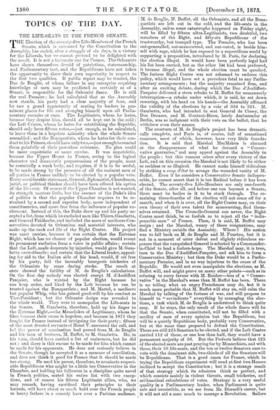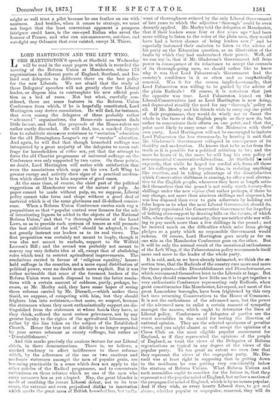TOPICS OF THE DAY
•
THE LIFE-SEATS IN THE FRENCH SENATE.
THE Election of the seventy-five Life-Members of the French Senate, which is entrusted by the Constitution to the Assembly, has ended, after a struggle of six days, in a victory for the Liberals, but we cannot pretend to be delighted with the result. It is not a fortunate one for France. The Orleanists have shown themselves devoid of patriotism, statesmanship, and Parliamentary tact, and the Republicans have not taken the opportunity to show their own superiority in respect to the first two qualities. If public report may be trusted, the Due de Broglie, of whom failure in any enterprise requiring knowledge of men may be predicted as certainly as of a Stuart, is responsible for the Orleanist fiasco. He is still the real Premier ; he had calculated that as the Assembly now stands, his party had a clear majority of four, and he saw a grand opportunity of seating its leaders in pro- minent places for life and avenging himself upon all Parlia- mentary enemies at once. The Legitimists, whom he hates, because they despise him, should all be kept out in the cold ; the Left Centre, whom he hates for establishing the Republic, should only have fifteen votes,—just enough, as he calculated, to leave them in a hopeless minority when the whole Senate assembled ; and the Bonapartists, whom he hates for their con- duct to his Princes, should have only two,—just enough to remind them painfully of their powerless existence. No plan could be more unpatriotic or more unwise. It was unpatriotic, because the Upper House in France, owing to the logical character and democratic prepossessions of the people, must be essentially a weak body, and requires, if it is to be useful, to be made strong by the presence of all the eminent men of all parties in France unlikely to be elected by a popular vote. Every considerable statesman, General, diplomatist, Churchman, jurist, or political thinker should have been offered his option of the life-seat. Of course if the Upper Chamber is not wanted, its strength matters little, but the essence of the Duke's idea of politics is that the popular Chamber requires to be re- strained by a second and superior body, more independent of constituencies, and more free from the influence of popular ex- citement. Instead of this, the Duke drew up and his party ac- cepted a list, from which he excluded men like Thiers, Gambetta, and General Faidherbe, and included the mass of mediocre Con- servatives devoted to Orleanism and material interests, who make up the rank and file of the Right Centre. His project was most unwise, because it was certain that the Extreme Right, which has no chance of popular election, would resent its permanent exclusion from a voice in public affairs ; certain that the Left, made desperate by injustice, would give M. Gam- betta carte-blanche; and certain that the Liberal leader, appeal- ing for aid to the Italian side of his head, would, if set free by his party, foil the incurably, bourgeois trickeries of the Orleanists by some daring stroke. The result at once showed the futility of M. de Broglie's calculations. On the first day nobody was elected except M. d'Audiffret Pasquier, who is wanted by the Right because he can keep order, and liked by the Left because he can be trusted against the Bonapartists ; and M. Martel, a mediocre but popular Whig, who has gained good-will by his conduct as Vice-President ; but the Orleanist design was revealed to the whole world. They were to monopolise the Life-seats in the Senate. M. Gambetta, therefore, held up his finger to the Extreme Right,—the Mamelukes of Legitimacy, whom he likes because their cause is hopeless, and because in 1871 they fought for France instead of intriguing for their party; fifteen of the most devoted servants of Henri V. answered the call, and lo I the power of nomination had passed from M. de Broglie and his man of business, M. Buffet, to M. Gambetta. He, in his turn, should have carried a list of eminences, but he did not ; and there is this excuse to be made for him which cannot be made for his opponents. He does not seriously believe in the Senate, though he accepted it as a measure of conciliation, and does not think it good for France that it should be made too strong. He used his power, therefore, to nominate respect- able Republicans who might be a little too Conservative in the Chamber, and holding his followers in a discipline quite novel in French politics, seated his entire list with two excep- tions, and of course his fifteen Legitimist allies, who, we may remark, having sacrificed their principles to their hatreds, will have about as much hold over the French people as heavy fathers in a comedy have over a Parisian audience.
M. de Broglie, M. Buffet, all the Orleanists, and all the Bona- partists are left out in the cold, and the life-seats in the Assembly, unless some catastrophe happened on Friday night, will be filled by fifteen ultra-Legitimists, two doubtful, two members of the Right, and fifty-six Republicans of the trustworthy, but tranquil type. The Premier, who has been out-generalled, out-manoeuvred, and out-voted, is beside him- self with rage, which he has exposed to a supercilious world by- supporting a proposition, introduced by M. Paris, for declaring the election illegal. It would have been perfectly legal had: his list been carried, but as the other list had been preferred, it became illegal, and the whole election must be quashed. The furious Right Centre was not ashamed to endorse this policy, which would have set a precedent fatal to any Parlia- mentary arrangements ; but the majority remained firm, and after an exciting debate, during which the Due d'Audiffret- Pasquier delivered a stern rebuke to M. Buffet for unmannerly interruption—a rebuke under which, it is said, he sat down cowering, with his head on his hands—the Assembly affirmed the validity of the elections by a vote of 334 to 321. M. Gambetta, who had intended to seat General de Cissey, the Due Decazes, and M. Gontaut-Biron, lately Ambassador at Berlin, was so indignant with their vote on the ballot, that he withdrew even their names.
The overturn of M. de Broglie's project has been dramati- cally complete, and Paris is, of course, full of sensational rumours, most of which, however, have very little founda- tion. It is said that Marshal MacMahon is alarmed at the disappearance of what he deemed a " Conser- vative guarantee," and may appeal against the Assembly to the people ; but this rumour arises after every victory of the Left, and on this occasion the Marshal is not likely to be either so reckless or so illogical. He cannot make himself ridiculous by striking a coup d'elat to avenge the wounded vanity of M. Buffet. Even if he considers a Conservative Senate indispen- sable, he cannot assert that it is too Radical before it has been elected. The seventy-five Life-Members are only one-fourth of the Senate, after all, and before one can bayonet a Senate, there must be bodies in it to be stuck through. The re- maining three-fourths of the election will not come off for a. month, and when it is over, all the Right Centre may, on their own theory of their own talent for manoeuvring, find them- selves returned. The Councils-General can never, the Right Centre must think, be so foolish as to reject all the " indis- pensable men" of France. Then, it is said, M. Buffet may resign ; and the Marshal, weary of these resignations, may- find a Ministry outside the Assembly. Where ? His notion• was to fall back on M. de Broglie and M. Fourtou, but it is not in a moment of utter defeat and slightly ridiculous ex- posure that the vanquished General is selected by a Commander- in-Chief to lead a forlorn-hope. The Marshal may, it is true, turn to the Due d'Audiffret-Pasquier, and ask him to form a. Conservative Ministry ; but then the Duke would be a Parlia- mentary Premier, and in no way injurious to the cause of the Republic. He would not even manipulate the elections, as M. Buffet will, and might prove on many other points—such as in refusing to curry favour with M. Rouher—less of a " Conser- vative " in the Marshal's sense than M. Buffet has been. There is no telling what an angry Frenchman may do, but it is much more probable that M. Buffet will stay on, will calm the Marshal by talking of the fortune of war, and will propose to himself to " revindicate " everything by managing the elec- tions, a task which M. de Broglie is understood to think quite easy. If he stays, the only result of the whole fiasco will be that the Senate, when constituted, will not be filled with a. medley of men of every opinion but the Republican, but will be a quietly Republican body, probably very Conservative, but at the same time prepared to defend the Constitution. There are still 225 Senators to be elected, and if the Left Centre carried 112 of these, or one less than half, they would have a, permanent majority of 36. But the Prefects believe that 125 of the elected seats are past praying for by Monarchists, and with these, their 56 life-seats, and the ten or twelve Senators sure to. vote with the dominant side, two-thirds of all the Senators will be Republicans. That is a good omen for France, which in trying the Republican experiment will need at first two Houses inclined to accept the Constitution ; but it is a strange result of that strategy which its admirers think so perfect, and which consists mainly in violent threats, small trickeries, and arithmetical calculations of votes. Strategy is a very useful quality in a Parliamentary leader, when Parliament is quite safe and irresistible, as we see from Mr. Disraeli's career, but it will not aid a man much to manage a Revolution. Sailors
might as well trust a pilot because he can feather an oar with neatness. And besides, when it comes to strategy, we must not forget that the least convenient opponent a pompous intriguer could have, is the one-eyed Italian who saved the honour of France, and who can out-manoeuvre, out-face, and out-fight any Orleanist that ever existed, except M. Thiers.







































 Previous page
Previous page